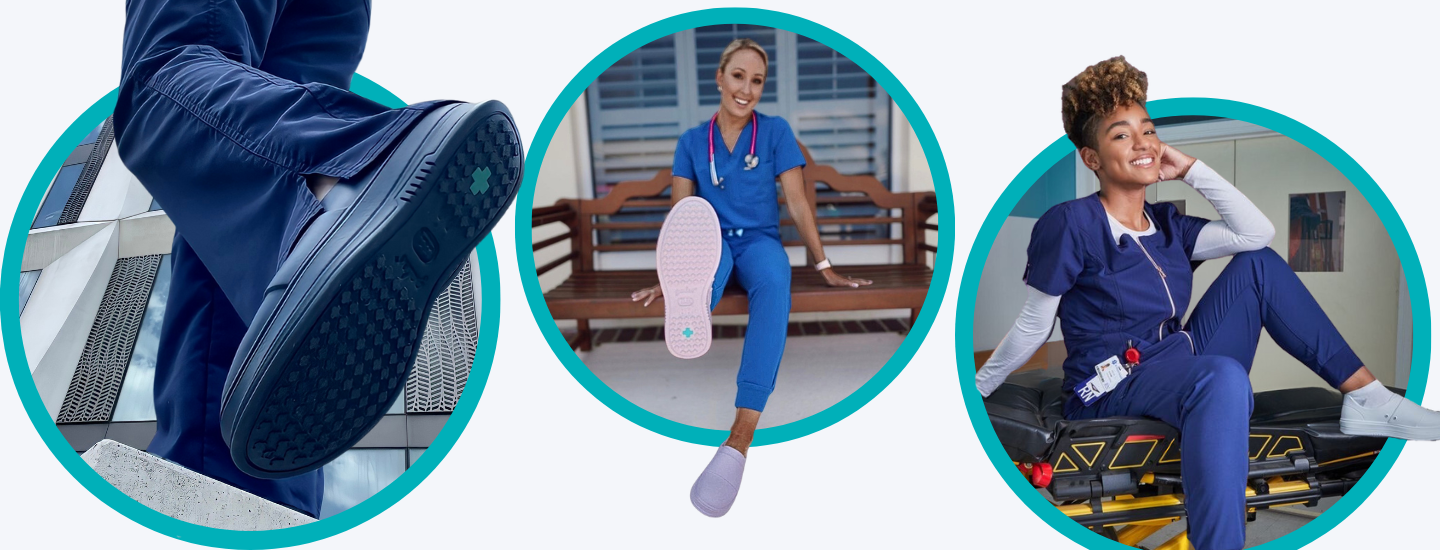
An Interview with Leslie Nguyen, RN
AT THE TIME OF THIS INTERVIEW LESLIE HAD JUST GRADUATED FROM THE UNIVERSITY OF WISCONSIN-MADISON NURSING PROGRAM. SHE HAS SINCE ACCEPTED A FULL-TIME JOB, BUT ALL QUESTIONS WERE ANSWERED BASED ON HER EXPERIENCES IN CLINICALS.
What department do you currently work in?
Leslie: The burn unit.
How many years do you have in nursing?
L: Two years, but I’ve been in the healthcare field since I was 17 or 18.
What shift do you work?
L: I work 12-hour shifts, from 7 a.m. to 7 p.m.
That is so long!
L: I actually like it, it flies by. The thing that was the game changer for me, because your feet do ache at the end of the day, was using compression socks.
What made you choose to go into nursing in the first place?
L: I was actually pre-med and then I took calculus and was like okay no. But actually, I'm really passionate about healthcare equity and diversity in the healthcare field, so I thought nursing was a great outlet for that because it's a lot more accessible for the general population. The first Healthcare professional that a patient usually sees is the nurse, it's who spends the most time with them and advocates for them. You get to know their life stories. I like being able to build a relationship with my patient. It's something that's really important because in Wisconsin 96% of the nurses are white. It definitely makes a difference when we're talking about care, I've definitely seen some situations of discrimination on the floor and I'm just like this is not appropriate at all, I don't even know how this is like happening in front of me right now. Black patients are disproportionately under-medicated. They don't have their pain adequately controlled and they're more likely to be labeled drug seekers. And now, with Covid, people are turning down doctors or nurses who are Asian.
What's your favorite part about your job and then your least favorite?
L: I really do like talking to my patients and like just being able to support them. I also like all of the medical things that we get to do and the critical thinking skills that are involved with it. I would say my least favorite part about nursing is that it is such a bureaucratic position in the sense that there's so little that you can control because so many of the hospital policies are shaped from a top-down approach. Often when there's benefits getting cut or there are positions being cut from the floor to save money it is usually nurses. Those people who have no idea what it's like to actually work on the floor with patients and so I think that's something that I have really found to be like a struggle in the nursing field. It's not like you get to show up and just do your job, nursing such is so interdisciplinary. Everybody is a part of a team and if there's someone who's not there it's really going to affect your job. In terms of administration, they don’t have any idea what it's like to have to take care of like six patients at one time if you don't know their needs. If they are really high risk sometimes you can spend a whole 12 hour shift with just one.
What does a typical day at work look like for you?
L: I will come in usually at 6:50. At 7 you hear report and do hand off with the previous nursing shift, so you get to hear all of the major conditions and any changes. Then you go and look at the patient's chart, you look at the orders to see what the provider ordered and what you need to do. You will look at what kind of issues they have and then you will do your assessment based off of that. So then you'll go in between 7:30 and 8:30 depending on how many patients you have. You'll pass meds, introduce yourself to the patient and all that stuff. Some patients, let's say if they have a spinal cord injury, you're doing a neuro assessment every 2 hours so you have to keep that in mind. Making sure they're like they got their lunch. Once 12 comes around you'll do another assessment, do some more charting, assess their pain, pass any meds. It also depends on the unit. When I worked on the burn unit they did their wound care between 8 to 12, and just taking care of any other random things they might need like taking a shower and brushing their teeth or if they have to use the bathroom, stuff like that. Then making sure they order dinner. During this time people start breaking out for lunch so you're taking other people's pager. Pass the next round of meds, anything else you need like changing any dressing. From that point on, once you get to the end of the day, you start to write your nursing notes and prepare your hand off report. Then you check on the patient to see if there's any last minute things you have to do or any last-minute orders.
What are your biggest safety concerns in your current workplace?
L: You deal with all kinds of bodily fluids. I remember looking in the mirror after one of my shifts and there were these two little red dots on my forehead. I thought they were pimples at first but it was actually blood from a patient who was hepatitis C positive. I'm definitely more mindful of infectious diseases because of that I have a really intense fear of losing my limbs after the units that I've been on. Having to see people get amputations, I definitely would never want that. So yeah I think that would be my biggest one. Infection control is huge, and also safety. I am only 5’2” it would be pretty easy to knock me out and so if patients get really combative that's something I worry about you yeah for sure. Hospital floors generally have Security on hand but since we are at the clinic we have to call security and wait for them to get to us there. That's something I'm always really mindful of.
Do you work around infectious fluids on a regular basis?
L: In the ENT clinic lots of saliva and mucus. Blood and open wounds in the burn unit.
How do you protect yourself from those infectious fluids?
L: Face mask, face shield. Making sure that you're really on top of things. On floors that are very high infection risk they actually provide you with scrubs. Once you get there you clock in and put on their scrubs. That helps reduce any infection risk. I've noticed a lot of people go to and from places in their scrubs so that's something I try not to do.
Have you ever gotten sick from those infectious fluids?
L: No, I have not.
Do you clean your work shoes at work or when you get home?
L:I’ll spray them with some disinfectant and leave them by the door
Do you have any kind of after work routines/ rituals when you get home, before interacting with other members of your household?
L: I always showered right after my clinicals.
TAGS:
SHARE:
